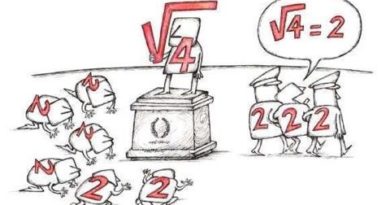Ask yourself dumb questions – and answer them!
 Dal blog di Terence Tao
Dal blog di Terence Tao
Don’t just read it; fight it! Ask your own questions, look for your own examples, discover your own proofs.Is the hypothesis necessary? Is the converse true? What happens in the classical special case? What about the degenerate cases? Where does the proof use the hypothesis? (Paul Halmos, “I want to be a mathematician”)
When you learn mathematics, whether in books or in lectures, you generally only see the end product – very polished, clever and elegant presentations of a mathematical topic.
However, the process of discovering new mathematics is much messier, full of the pursuit of directions which were naïve, fruitless or uninteresting.
While it is tempting to just ignore all these “failed” lines of inquiry, actually they turn out to be essential to one’s deeper understanding of a topic, and (via the process of elimination) finally zeroing in on the correct way to proceed.
So one should be unafraid to ask “stupid” questions, challenging conventional wisdom on a subject; the answers to these questions will occasionally lead to a surprising conclusion, but more often will simply tell you why the conventional wisdom is there in the first place, which is well worth knowing.
For instance, given a standard lemma in a subject, you can ask what happens if you delete a hypothesis, or attempt to strengthen the conclusion; if a simple result is usually proven by method X, you can ask whether it can be proven by method Y instead; the new proof may be less elegant than the original, or may not work at all, but in either case it tends to illuminate the relative power of methods X and Y, which can be useful when the time comes to prove less standard lemmas.
It’s also acceptable, when listening to a seminar, to ask “dumb” but constructive questions to help clarify some basic issue in the talk (e.g. whether statement X implied statement Y in the argument, or vice versa; whether a terminology introduced by the speaker is related to a very similar sounding terminology that you already knew about; and so forth). If you don’t ask, you might be lost for the remainder of the talk; and usually speakers appreciate the feedback (it shows that at least one audience member is paying attention!) and the opportunity to explain things better, both to you and to the rest of the audience. However, questions which do not immediately enhance the flow of the talk are probably best left to after the end of the talk.




